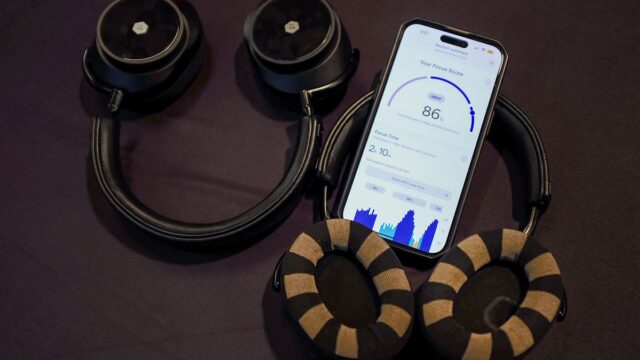The founders of Neurable want to make brain measurement available to everyone. Its first-of-its-kind headphones could bring brain tracking to the masses.
When Apple launched its watch in 2015, the device wearable It looked like a device. Ten years later, millions of users use its heart rate and movement tracking features, and some even detect arrhythmias and Parkinson’s disease with it.
The co-founder of Neurable, Ramsés Alcaide, wants us to be able to do the same with our brain.
“It’s crazy that we’re not keeping track of the most important organ in our body,” he explains to Euronews Next. “There are people with Alzheimer’s who don’t even know they have this disease until ten years later. That’s crazy, and it should never happen again.”
While classical instruments for record brain wavesElectroencephalograms (EEGs) are typically cumbersome handheld devices with over a hundred sensors, Neurable has spent the last ten years creating an EEG device that fits into a headset.
The company believes that brain wave tracking can help focus and improve people’s lives, for example by tracking Alzheimer’s, post-traumatic stress disorder, Parkinson’s disease, fatigue and even mental deficiency disorder. attention hyperactivity disorder (ADHD).
How Neurable headphones work
The connections between the neurons in our brain create electrical activity, which increases when we concentrate. Electroencephalograms track the activity leaving our brain and entering our scalp.
Neurable’s technology uses AI to amplify signals and detect patterns through algorithms. Based on the brain wave, the technology can determine whether someone is focused or not.
“Your brain gets tired before your body, but you usually only take a break when your body gets tired because your brain doesn’t have pain receptors. It can’t tell you that it’s tired,” explains Alcaide, who suffers from ADHD and uses headphones to concentrate.
“The headphones help me prevent burnout because they alert me when I need to take breaks at the right time. And if I ever get distracted, they emit an audible tone to remind me to refocus. I use it a lot when I read,” he details.
Neurable only manufactures the AI portion of this brain-computer interface (BCI) and partners with manufacturers to include EEG in their products.
Their first headphones were developed with high-end audio equipment creator Master & Dynamic. While tracking their brain waves, users can listen to music and cancel out outside noise, just like other high-end headphones.
Wait, what about my data?
Although it is possible to decode language “to some extent” with BCIs, it is currently only possible to do so with invasive devices or MRIs.
The company prides itself on selling to end users rather than corporations and using data “to directly benefit the person it came from,” according to Adam Molnar, co-founder of Neurable and a data privacy expert. Raw user data is processed by the headphones’ Neurable chip and de-authenticated before being shared with the accompanying app.
Although they treat the data with caution, the founders are also confident that the information is not sensitive should it fall into the hands of hackers.
“Say you have someone’s attention streams, you would need to know a lot more, like what they were doing and where they were, to start making ‘unethical inferences’. And we didn’t build that into the app,” explains Molnar.
The co-founder added that despite the many possible abuses with ICB, Neurable focuses on the “most beneficial” uses.
“When you drive, there is a sign that indicates when the oil needs to be changed. You can continue driving hundreds, if not thousands of miles when that light is on, but it is suggested that if you take care of this, you can help the machines in the long run “And I don’t think the brain is that different,” Molnar explained.
Cognitive inequality
For Dr. Marcello Lenca, professor of Ethics of Artificial Intelligence and Neuroscience at the Technical University of Munich, devices that improve our capabilities are exciting, but require caution.
He stressed that the success of BCIs depends on their responsible use and the attention paid to privacy. He also warned of the risks of inequality.
“I don’t think this technology is unethical per se, we humans tend to improve our functions all the time. But it will be very risky to do so in a world where technology is unequally distributed. It will amplify global inequalities more than any other thing, because it introduces a cognitive inequality,” he said about technologies such as Neurable headphones, capable of enhancing people’s mental abilities.
Neurable’s MW75 Neuro headphones can now be pre-ordered for $700 (€645) (the original version of Master & Dynamic’s non-AI model costs $100 (€92) less), and orders will ship to the United States and Canada starting of September.
“We would like to be able to integrate this into less expensive products to increase product accessibility. But most technologically advanced products start at the high end. Consider the Tesla Roadster, which became more scalable as various models came out.” explains Molnar, co-founder.
If adopted by the general public, Neurable’s technology would open the doors to monitoring brain activity at home on a scale never seen before.
“We’re giving people the ability to understand how their brain works so they can better act accordingly,” Molnar says.








